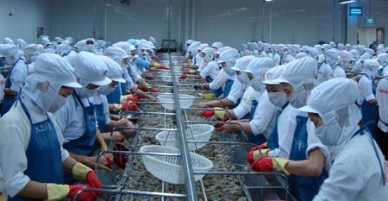In the past 10 years (2007-2016), the import volume of shrimp into the country ranged from 76.7 thousand MT in 2007 to 83 thousand MT in 2016, up 8%. In the last 4 years (2013-2016), the demand for shrimp in South Korean was stable due to the decrease in domestic fish production and a tendency towards a healthy diet.
According to the World Trade Center (ITC), in the first 7 months of 2017, shrimp imports into the country reached US$307.3; up 13% year on year. Among the largest shrimp suppliers to South Korea, imports from Vietnam, Thailand and Ecuador increased by 15.8%; 26.8%; 33.9% respectively, while imports from China decreased 37.4% over the same period in 2016.
South Korea stayed as the fifth largest importer of Vietnam shrimp behind the EU, Japan, China and the U.S; accounting for 9.7% of Vietnam’s shrimp exports to markets. It was also the third largest buyer of Vietnam whiteleg shrimp in 2016.
In the past 10 years (2007-2016), Vietnam’s shrimp exports to South Korea showed the continuous positive growth. In 2015, exports to the market decreased due to a sharp increase in 2014 with an increase in the global shrimp prices and the dollar. In the first 9 months of 2017, Vietnam’s shrimp exports to the market kept a good growth rate. As of 15th Sep 2017, Vietnam’s shrimp export to South Korea hit US$243.2 million; up 29.8% over the same period in 2016.
With the stable demand and high export prices and tax incentives under The Free Trade Agreement between Vietnam and Korea (VKFTA); Korea expected to be a potential importing market of Vietnam in the coming time while exports to the main traditional markets face difficulties.
From 2007 to 2016, exports of whiteleg shrimp to South Korea remained to take the largest share in Vietnam’s shrimp sales to the market, from 42% in 2009 to over 80% in 2016. With the strong demand over the years, in 2016, South Korea held as Vietnam's third largest whiteleg shrimp importer. Of that, the country prefers fresh/live/frozen whiteleg shrimp (HS code 03). From 2009 to 2016, shipments of live/fresh/frozen whiteleg shrimp (HS code 03) to Korea were 1.4 - 2.2 times higher than those of processed items (HS code 16). In the coming time, the import demand for whiteleg shrimp in South Korea expected to continue the rise.
Sales of black tiger shrimp took the second proportion in total shipments to the market, but decreased from 23.5% in 2009 to 10.5% in 2016. In the period of 2010-2012, the proportion of black tiger shrimp accounted for 50-60% in total shrimp exports. However, in the period of 2013-2016, it decreased to 29-30% due to a drop in Vietnam’s export volume of this item.
Although Vietnam’s exports of black tiger shrimp to South Korea were low, the export turnover to the market in the last two years (2015-2016) tended to increase.
In South Korea, Vietnam shrimp has to compete with the same item from China and India. However, Vietnam enjoyed the lowest import duty (10%) compared to other competitors such as China (20%), India (12.5%), Ecuador (20%) and Thailand (10%).
After a year implementing the VKFTA, Vietnam's shrimp exports to the market recorded many positive changes.

